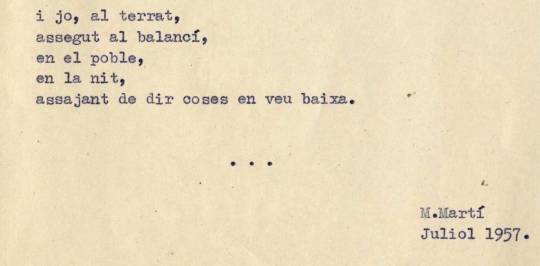#miquel martí i pol
Note
Hello! Another tumblr user I follow has posed a challenge: memorize one poem per month in 2024. I would like to include at least one poem in Catalan in my journey. Could you recommend any good poems or poets for this?
Hello! We have many very talented poets. My favourite poet is Salvador Espriu, other good ones are Miquel Martí i Pol, Vicent Andrés Estellés, Jacint Verdaguer, Maria-Mercè Marçal, Pere Quart, Josep Carner, Ausiàs March, Joan Maragall, Montserrat Abelló, J.V. Foix, Gabriel Ferrater, Joana Raspall, Joan Alcover, Enric Casasses, among others.
I'll add 7 of my favourite short/short-ish poems (+translation to English) under the cut. Poetry is very personal and these are just the ones that I really like, but I'll be happy if anyone else wants to add more of their favourite Catalan poems.
1. Enyore un temps que no és vingut encara (I Miss a Time That's Not Yet Come) by Vicent Andrés Estellés.
Enyore un temps que no és vingut encara
com un passat d’accelerada lluita,
de combatius balcons i d’estendards,
irat de punys, pacífic de corbelles,
nou de cançons, parelles satisfetes,
el menjador obert de bat a bat
i el sol entrant fins al darrer racó.
Em moriré, però l’enyore ja,
aquest moment, aquest ram, aquest dia,
que m’ha de fer aixecar de la fossa
veient passar la multitud contenta.
Translation:
I miss a time that has not arrived yet
like a past of accelerated fight,
of combative balconies and standards,
angry of fists, peaceful of sickles,
new of songs, satisfied couples,
the living room wide open
and the sun entering until the last corner.
I will die, but I miss it already,
this moment, this bouquet, this day,
that shall make me get up from the grave
watching the happy crowd pass by.
2. Assaig del càntic en el temple (Attempted Canticle in the Temple) by Salvador Espriu.
Oh, que cansat estic de la meva
covarda, vella, tan salvatge terra,
i com m’agradaria d’allunyar-me’n,
nord enllà,
on diuen que la gent és neta
i noble, culta, rica, lliure,
desvetllada i feliç!
Aleshores, a la congregació, els germans dirien
desaprovant: «Com l’ocell que deixa el niu,
així l’home que se’n va del seu indret»,
mentre jo, ja ben lluny, em riuria
de la llei i de l’antiga saviesa
d’aquest meu àrid poble.
Però no he de seguir mai el meu somni
i em quedaré aquí fins a la mort.
Car sóc també molt covard i salvatge
i estimo a més amb un
desesperat dolor
aquesta meva pobra,
bruta, trista, dissortada pàtria.
Translation:
How tired I am of this
my craven, ancient, savage fatherland;
and how it would delight me to leave,
going north,
where they say that people are noble and clean,
cultured, rich, free,
awake/unsupervised and happy!
Then, my brethren would tell the congregation, disapprovingly:
"Leaving his native place, a man becomes
like a bird leaving the nest",
while I, in the distance, would laugh at
the law and the ancient wisdom
of this my arid people.
But the dream will never be followed,
I’ll stay here until my death.
For I too am full of cowardice and savagery,
and with a desperate pain I love this my poor,
unclean, sad, unlucky fatherland.
3. Divisa (Motto) by Maria-Mercè Marçal. This one's short and easy!
A l’atzar agraeixo tres dons: haver nascut dona,
de classe baixa i nació oprimida.
I el tèrbol atzur de ser tres voltes rebel.
Translation:
I am grateful to fate for three gifts: to have been born a woman,
from the working class and an oppressed nation.
And the turbid azure of being three times a rebel.
4. Possible introducció a un epitalami (Possible Introduction to an Epithalamium) by Salvador Espriu
I posted this a while ago, find the text and translation in this post:
5. Plus Ultra ("Further" in Latin) by Jacint Verdaguer
Text and translation in this post:
6. Aquesta remor que se sent (This Murmur We Hear) by Miquel Martí i Pol.
Text and translation in this post:
7. Mester d'amor (Knowing How to Love) by Joan Salvat-Papasseit
Si en saps el pler no estalviïs el bes
que el goig d'amar no comporta mesura.
Deixa't besar, i tu besa després
que és sempre als llavis que l'amor perdura.
No besis, no, com l'esclau i el creient,
mes com vianant a la font regalada.
Deixa't besar -sacrifici fervent-
com més roent més fidel la besada.
¿Què hauries fet si mories abans
sense altre fruit que l'oreig en ta galta?
Deixa't besar, i en el pit, a les mans,
amant o amada -la copa ben alta.
Quan besis, beu, curi el veire el temor:
besa en el coll, la més bella contrada.
Deixa't besar
i si et quedava enyor
besa de nou, que la vida és comptada.
Translation:
If you know its pleasure, don't skip the kiss
for the joy of loving has no measure.
Let yourself be kissed, and kiss after it
for it's always on the lips that love lasts.
Don't kiss, no, like the slave and the believer,
but like the passer-by does with a delightful fountain.
Let yourself be kissed -fervent sacrifice-
the more burning, the more faithful is the kiss.
¿What would you have done if you died before
without fruit other than the zephyr on your cheek?
Let yourself be kissed, and on the chest, on the hands,
male or female lover -the cup raised high.
When you kiss, drink; may the glass cure the fear:
kiss on the neck, the most beautiful place.
Let yourself be kissed
and if there's yearning left
kiss again, for life is finite.
These are some I like. You can find more Catalan poems in this blog's tag #poesia.
#poesia#literatura#arts#ask#3bearsand10000rats#poetry#literature#poems#catalan#català#valencià#coses de la terra#romance languages#vicent andrés estellés#salvador espriu#maria-mercè marçal#maria mercè marçal#jacint verdaguer#miquel martí i pol#joan salvat-papasseit
30 notes
·
View notes
Text
Miquel Martí i Pol - Tua Solidão
Enquanto puderes, não desperdicestua solidão, dedicando-a a uma absurdabusca do nada, nem te persigasobsessivamente por escuros corredores.Assustado pela luz dos preceitos.Sai sob o sol pleno e observaas coisas difíceis.Considera que o jogo desmedido das palavrasnão te servirá de nada se não te apoiaresnaquilo que te rodeia. Há as pedrase as árvores e as pessoas e tantas coisasque podes tocar com…

View On WordPress
0 notes
Text
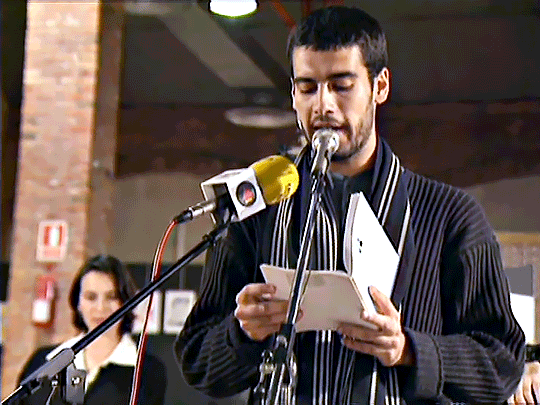
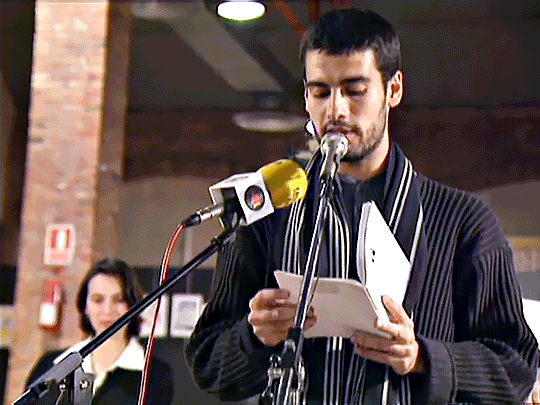
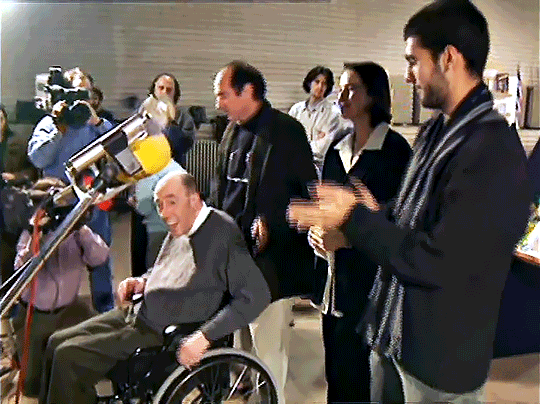
Pep Guardiola reading the poetry of Miquel Martí i Pol (1996)
24 notes
·
View notes
Text

O tempo não é desperdiçado ou ganho, acontece e vivemos isso, com ventos favoráveis às vezes; outras vezes, com angústia. Tudo é incerto e, ao mesmo tempo necessário, e você nunca sabe o que está por trás das dunas do grande esforço para crescer e entender. O tempo passa: Ninguém perde ou ganha. O tempo passa e passamos.
✍️ _Tiempo perdido_, Miquel Martí i Pol, 1929-2003
23 notes
·
View notes
Text
Non chiedo troppo: poter parlare senza contraffare la voce, camminare senza stampelle, fare l'amore senza dover chiedere dei permessi, scrivere in una carta senza regole.
Oppure, se vi sembra troppo: scrivere senza dover contraffare la voce, camminare senza regole, parlare senza dover chiedere dei permessi, fare l'amore senza stampelle.
Oppure, se vi sembra troppo: fare l'amore senza dover contraffare la voce, scrivere senza stampelle, camminare senza dover chiedere dei permessi, poter parlare senza regole.
Oppure, se vi sembra troppo.
Miquel Martí i Pol
10 notes
·
View notes
Text
catalan cover group of peter paul and mary called miquel martí i pol
3 notes
·
View notes
Note
happy sant jordi waru!!! <3 do you have a favorite catalan poet?
Thank you so much 💜💜💜
To be honest, I'm I don't read that much poetry in any language. I do own a couple of poetry books in Spanish, but none on Catalan. From the ones I do remember having to study/learn in school I'd say Miquel Martí i Pol because his poems, at least the ones that i had to study, had some rhythm into them that made it easy to follow.
1 note
·
View note
Text
Un dia seré mort
i encara serà tarda
en la pau dels camins,
en els sembrats verdíssims,
en els ocells i en l’aire
quietament amic,
i en el pas d’aquells homes
que desconec i estimo.
Un dia seré mort
i encara serà tarda
en els ulls de la dona
que s’apropa i em besa,
en la música antiga
de qualsevol tonada,
o, encara, en un objecte,
el més íntim i car,
o potser en els meus versos.
Digueu-me quin prodigi
fa la tarda tan dolça
i tan intensa alhora,
i a quin prat o quin núvol
he d’adscriure el meu goig,
perquè em sé perdurable
en les coses que em volten,
i sé que algú, en el temps,
servarà el meu record.
Miquel Martí i Pol, Paraules al vent.
0 notes
Text

A veces, una tarde cualquiera, la dulzura se instala en las palabras.
Miquel Martí i Pol
0 notes
Text
The Catalan authors who were kept out of the Nobel Literature Prize for being Catalan
Did you know that there have been a handful of Catalan writers who were candidates to win the Nobel Literature Prize, but because of Spanish interference they never did?
The Nobel Prize discloses its debate and reasoning process 50 years after each edition. This means that we already know the details of what happened in the earliest editions of this Prize, which was started in 1901.
The name of the Catalan play-writer Àngel Guimerà (author of Marta of the Lowlands, Mar i cel, La filla del mar...), whose works have been translated to many languages and played all around Europe and the Americas, with many film and opera adaptations, sounded often in the Nobel committee. He was presented as a candidate to win the Nobel Prize 17 times in a row, since 1907 until his death in 1924. In the editions of 1917 and 1919, many were convinced he would win. However, the declassified documents show why he didn't: as written by the man who was then president of the Nobel Committee, Haralg Härne, Guimerà wasn't given the prize "to avoid hurting the national pride of the Spanish". In 1919, Härne writes that the objective of the Nobel Prize is to promote peace and thus to award Guimerà and show support for a minority culture would be to encourage internal conflict (🤦). The Academy decided that they couldn't give a prize to Guimerà "before awarding another writer who expresses himself in the most ancient noble language of the country" (weird way to mean "the official language", aka Spanish, because they surely didn't mean Basque). In summary, if a Catalan is to be considered, he must always be second to a Spanish man. Even when the Catalan is, in the words of the Nobel Academy, "the most eminent writer of our times", he can never be considered an equal, always must be behind.
Àngel Guimerà wrote in the Catalan language, which was discriminated against by Spanish and considered an enemy by the Spanish government and much of Spanish society. Guimerà was a firm defender of the right to use the Catalan language and that nobody should be forced to speak the imperial languages instead of their own, and was involved with the political movement for the rights of Catalan people. For this reason, every time the famous Swedish academy was considering Guimerà, the Spanish Royal Academy of Language (RAE) fought it with all its might. Nowadays, Guimerà's theatre plays continue to move thousands of spectators every year.
The same happened again with the poet Josep Carner. In the 1960s, Josep Carner was on exile, because he was a Catalan poet writing in Catalan and who stood against the fascist dictatorship of Spain, which persecuted the Catalan language and identity. Famous writers from around the world, including T. S. Eliot, François Mauriac, Giuseppe Ungaretti and Roger Caillois, supported Josep Carner's candidacy to win the Nobel, but the Spanish Government did everything possible to obstruct it. We don't know if Carner would have won or not, but he was deprived of even trying because of the Spanish government's hatred of Catalan.
Something similar seems to have happened between the 1970s and 1990s to three other Catalan poets: Salvador Espriu, J. V. Foix, and Miquel Martí i Pol, where they did not get any support from the Spanish authorities, so we don't know how it would have ended up.
Another example of what it means to have a state actively working against you because of bigotry against your cultural group.
Sources: book Det litterära Nobelpriset by the president of the Nobel Committee Kjell Espmarck, Pep Antoni Roig (El Nacional), Joan Lluís-Lluís (El Punt Avui), and Jordi Marrugat (Institut Ramon Llull).
#literatura#arts#història#àngel guimerà#josep carner#literature#books#reading#nobel prize#nobel literature prize#catalanophobia#catalanofòbia#catalan#cultures#writing#human rights#minority languages#1900s#history
58 notes
·
View notes
Text
La poesía como experiencia de vida, Miquel Martí i Pol
[…] Creo que no resulta nada arriesgado considerar que el poeta vive la poesía como una experiencia más de las que, a lo largo de su existencia, lo configuran como persona. No hablo, evidente…
Origen: La poesía como experiencia de vida, Miquel Martí i Pol – Calle del Orco

View On WordPress
1 note
·
View note
Text
IV ENCUENTRO LITERARIO: MIS NOVELAS Y YO OS ESPERAMOS.
IV ENCUENTRO LITERARIO: MIS NOVELAS Y YO OS ESPERAMOS.
Este próximo sábado día 15 de octubre estaré en el IV Encuentro de los Auténtic@ Devoralibros en LA BIBLIOTECA MIQUEL MARTÍ I POL DE SANT JOAN DESPÍ.
Auditorio Miquel Martí i Pol Av. de Barcelona, 83-85. 08970 Sant Joan Despí. Barcelona
En encuentro se inicia a las 9h de la mañana hasta las 20h. Estaré por allí hasta el medio día con mis dos últimas novelas, en la zona de librería. Si alguien…

View On WordPress
0 notes
Photo

Se parlo dei tuoi occhi mi fanno eco
sedie di vimini e un tramonto di colombi.
I tuoi occhi, intensi come un urlo nel buio.
Se parlo delle tue labbra mi fanno eco
grotte profonde e ritmi di pigrizia.
Le tue labbra, vicine come la notte.
Se parlo dei tuoi capelli mi fanno eco
spiagge sconosciute e la quiete delle chiese.
I tuoi capelli, come la schiuma del vento.
Se parlo delle tue mani mi fanno eco
pesche dolcissime e odore di vestiti vecchi.
Le tue mani, lievi come un sospiro.
Se parlo del tuo corpo,
del tuo corpo che ho amato,
solo la mia voce mi fa eco,
e allora chiudo avidamente gli occhi
e recito a me stesso il segreto delle strade
che ho seguito lentamente sul tuo corpo
caldo come la luce,
denso come il silenzio.
Miquel Martí i Pol, da Il lungo viaggio, 1976
34 notes
·
View notes
Text
(...) Aquellos a quienes no he amado,
aquellos a quienes ni siquiera he conocido,
conservarán la parte más pura de mí.
Vosotros, solitarios, que diréis mi nombre
y hallaréis la paz leyendo mis poemas.
Para vosotros escribo
con el afecto de un abrazo de hermano.
No me améis por el esfuerzo que entraña.
Escribir para vosotros
es como repetirse lentamente
los versos de un poema querido.
Miquel Martí i Pol
#Miquel Martí i Pol#poesía#fragmento#literatura#lit#poema#querido#esfuerzo#paz#poemas#versos#vosotros#afecto#hermano
15 notes
·
View notes
Text
I sobretot no oblidis
I, sobretot, no oblidis que el teu temps
és aquest temps que t’ha tocat de viure:
no un altre, i no en desertis,
orgullós o covard, quan et sentis cridat
a prendre part, com tothom, en la lluita,
car el teu lloc només tu pots omplir-lo.
Creix, això sí, en la llengua la tribu,
mot a mot, fidelíssim,
i en l’esperit de revolta que alerta
la teva gent contra la defallença,
perquè en tu s’acompleixi, poc a poc, el futur
i mai no et trobis desvalgut i sol.
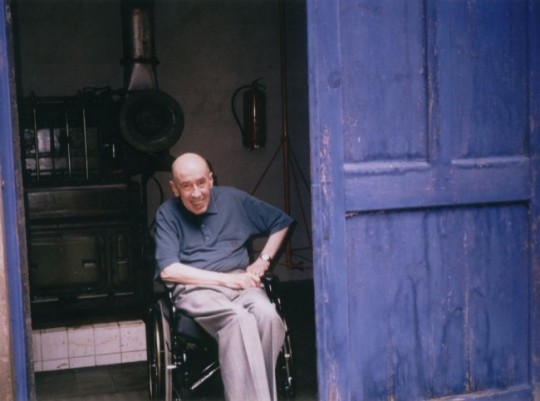
1 note
·
View note
